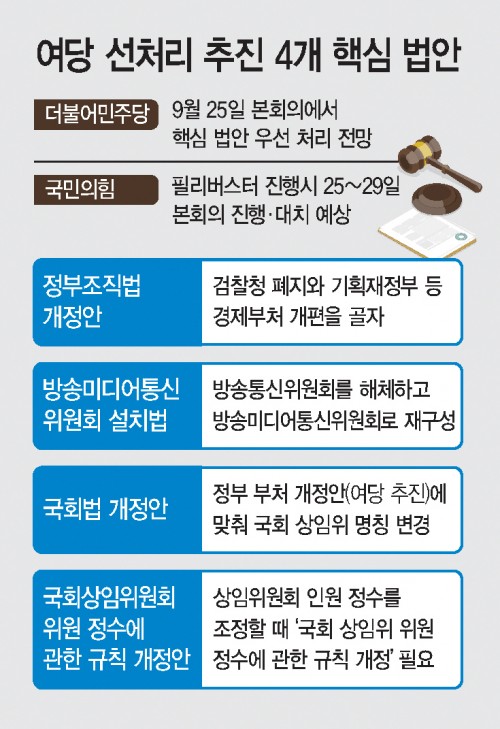 |
The National Assembly faces the prospect of a prolonged deadlock, potentially lasting up to 69 days, as rival parties remain at loggerheads over the government reorganization bill.
Despite last-minute negotiations on September 24 ahead of a plenary session scheduled for the following day, the ruling Democratic Party of Korea (DPK) and the opposition People Power Party (PPP) failed to reach a compromise.
The DPK announced plans to prioritize four key bills, including the government reorganization bill, the Broadcasting and Media Communications Commission Act, amendments to the National Assembly Act, and revisions to the rules on the number of standing committees. The reorganization plan includes controversial measures such as abolishing the prosecution service, splitting the Ministry of Economy and Finance, restructuring the Financial Services Commission and the Financial Supervisory Service, and creating a new Ministry of Climate, Environment and Energy.
The PPP has fiercely opposed the plan, denouncing it as a “hasty push” that lacks proper preparation. While the party previously limited filibusters to certain contentious bills, it declared it would now launch unlimited debates on all legislation submitted by the DPK. Outnumbered in parliament, the PPP intends to use filibusters to spotlight what it calls the ruling party’s “legislative monopoly.”
PPP floor leader Song Eon-seok criticized the talks, saying, “Negotiations were meaningless. The ruling party had neither the will nor sincerity, only going through the motions.” He warned that unilaterally passing the bill would create “a distorted situation in which even government officials do not know the details of their own ministries or the timeline for implementation,” adding that the DPK’s rush would ultimately “hurt people’s livelihoods.”
If both sides stick to their strategies, the Assembly could be paralyzed for more than two months. Extended filibusters tied to each bill could delay not only the reorganization plan but also vital legislation on the economy and the budget. With the annual parliamentary audit set to begin next month, critics warn the prolonged standoff could bring government operations to a near standstill.
Most Read
-
1
-
2
-
3
-
4
-
5
-
6
-
7





















